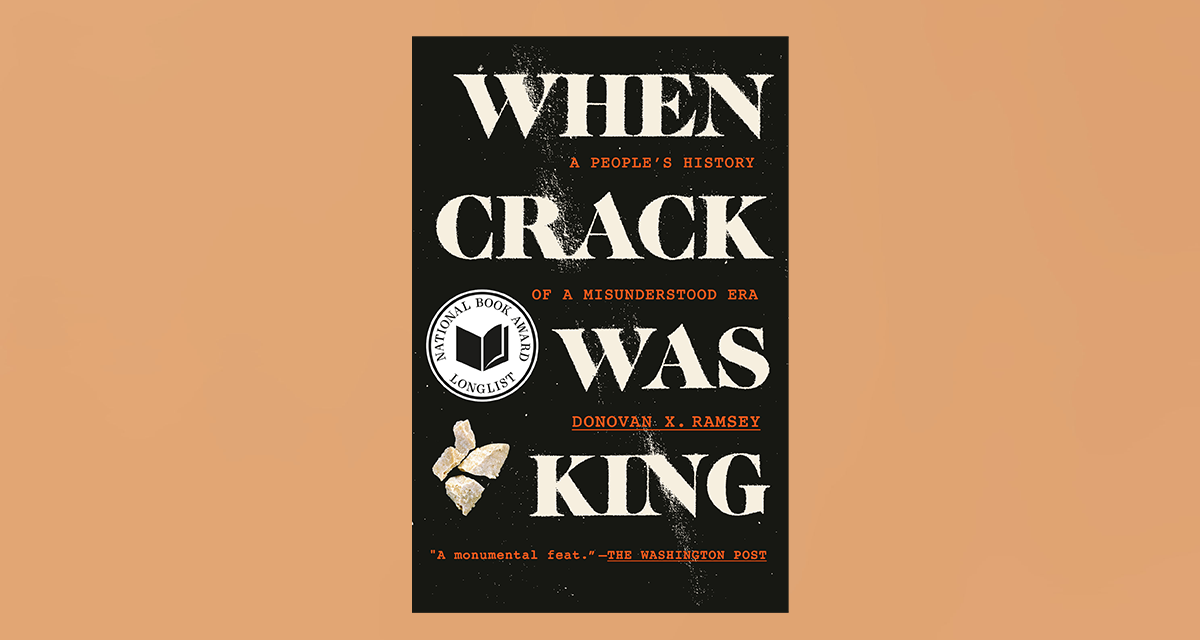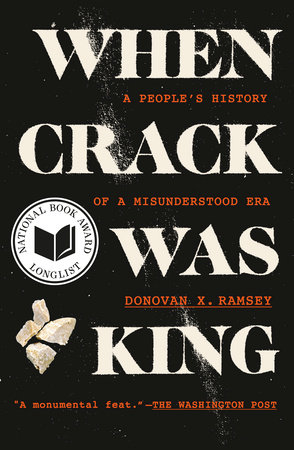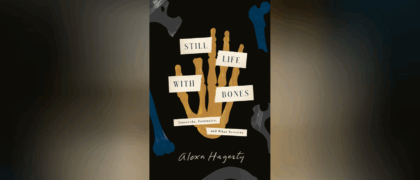The crack epidemic of the 1980s and 1990s is arguably the least examined crisis in American history. Beginning with the myths inspired by Reagan’s war on drugs, journalist Donovan X. Ramsey’s exacting analysis in When Crack Was King traces the path from the last triumphs of the Civil Rights Movement to the devastating realities we live with today: a racist criminal justice system, continued mass incarceration and gentrification, and increased police brutality.
1
Elgin
Elgin Swift is one face of the American Dream. The forty-five-year-old car salesman earns a six-figure salary and manages a staff of twenty. Just as important: Elgin is self-made, having been promoted from sales representative more than fifteen years ago. Before that, he worked his way up from busboy to manager at a small Italian restaurant.
He also has a number of successful business ventures. Elgin owns rental properties, publishes a popular podcast, and has significant investments in cryptocurrency. His success in business has provided him with all the creature comforts one could want: a luxury condo, designer clothes, and a lifestyle that includes plenty of travel, fine dining, and leisure activities.
Elgin is practically indistinguishable from the other middle-aged white men commuting into New York City every day from New Jersey. He’s of average height and weight. He keeps the hair on his head and his beard closely cropped. His prominent nose and large dark eyes render him ethnically ambiguous. He could be Italian, Jewish, Latino. But upon close inspection, there are some things that set him apart. His narrow face is always framed by a neat line-up that fades to skin above the ears. He loves the boom bap of eighties hip hop, graffiti, and classic sneakers. He’s also obsessed with making money, the art of the hustle.
His style and interests were formed during his childhood in crack-era Yonkers, New York. He’s now years and miles away from that reality, but Elgin’s past continues to color his life as much as his New York accent colors his speech.
I met Elgin Swift in my search to find people whose relatives struggled with crack addiction. I encountered hundreds after putting out an open call via social media platforms, and people shared with me things they’d never told anyone about loved ones and relationships lost to crack.
I interviewed Swift after one of his friends insisted we connect. To be honest, I was reluctant at first to include him—a white man—in a book on how the Black community survived the crack era, but I became convinced the more we talked that his story might illustrate crack’s almost gravitational pull, the way it touched anyone and everyone close to poor Black and Latino people in the nation’s urban centers.
Swift described the unique racial mix but broad poverty of Yonkers in the seventies and eighties. He detailed his childhood in the streets, the way he was neglected by his addict father but adopted by the Black and Latino people around him. I knew I had to write about him, however, after he shared his recurring nightmares with me, terrifying visions that illustrate the traumatic impact of the crack era. Their details vary. Sometimes they start in the apartment or in the shelter. They all end up the same. He dreamed recently that he was on vacation in Mexico walking past a tree when, suddenly, a zebra fell out of it. The zebra’s legs were broken, and it was shaking uncontrollably. All Elgin could do was pet the animal in an attempt to comfort it. But eventually the police came, and they assumed that he’d broken the zebra’s legs. As in all his nightmares, Elgin wound up in a prison cell. In the nightmare, his cell was a three-by-three room not even big enough to spread his arms in. He remembers thinking that he couldn’t live like that, that his only option was to kill himself.
Everything comes rushing to the surface after Elgin has those nightmares. He starts to worry that maybe he spoiled his daughter, Asia, that he did her a disservice by giving her things instead of his undivided attention and time.
Then he starts thinking about his father, Stephen, and wondering whether it’s worth it to give things one last try. The last he heard, the old man had been diagnosed with dementia and moved into a care center in the Bronx. Is there enough of Stephen’s mind left to apologize and mean it? Would reaching out be worth the pain of seeing him like that? Will Elgin regret it forever if Stephen died and he missed his opportunity?
He could add that to his regret over how things ended with Artiesha, whom he left to chase his own happiness. A part of him wonders if karma or some higher power will allow him to be fully happy, or content at least, considering how he hurt her.
Elgin’s nightmares also bring to the surface his deepest anxiety: the fear that he’ll end up where he started—back in Yonkers, poor and desperate with no way out. It’s in the moments after he wakes that he realizes how present that fear is in his everyday life. The nightmares call that fear forward like a word that has been on the tip of his tongue. He’s waiting, he realizes, for the other shoe to drop, for the life that he’s built to suddenly evaporate.
The successful salesman is in therapy now. During his first session, Elgin shared his nightmares and the details of his upbringing. The therapist offered something he hadn’t given much thought to. “You have classic PTSD,” she said. Elgin laughed to himself when she said it. The diagnosis was obvious, unexpected, and strangely comforting.
2Lennie
She’s gone by many names—Lennie, Linda, Black. Today, most people call her Miss Woodley. It’s a simple thing, being addressed that way. Most women merely age into “Miss.” It’s the step after “young lady” and right before “ma’am.” Miss Woodley, on the other hand, had to earn it.
You wouldn’t know it just by looking at her—she looks not unlike many other middle-aged Black women—but Miss Woodley was addicted to crack for nearly thirty years. The drug, which she started using as a teenager, almost robbed her of her very humanity. The world saw her as a crackhead, a “strawberry,” just about everything except “Miss.”
She succumbed to addiction for decades but managed to hold on to some sense of herself—who she was before crack and who she wanted to be. So, when the smoke finally cleared, she was still standing—not diminished but fortified, strengthened in the places where she had been bruised and broken: Miss Woodley.
Miss Woodley is Los Angeles through and through. She refers to the area in South Central where she grew up as “the Hood.” She calls her friends “the homies.” She has the Black Angeleno accent, too, a unique blend of linguistic influences that transforms words like “party” into “poor-dy,” and “folk” into “foke.”
Like many Black women, she looks younger than her fifty-eight years. She’s dark-skinned with a round face and big smile, not tall but not short, and loves to “dress.” That means more than just putting on clothes. Miss Woodley carefully puts together her looks, favoring bold prints, cutouts, heels, and other details that make her stand out. Her hair is important, too. She changes it just about every week, and it’s always neatly coiffed.
People gravitate to Miss Woodley for her flair—the way she can forge connections with strangers over the smallest things, her sense of humor, and the ease with which she talks about who and where she’s been. On more than one occasion, she has found herself meeting someone, learning their darkest secrets during that meeting, then crying with them. She’s like a cool auntie—stylish, self-possessed, knowing but not judgmental.
Miss Woodley regarded me cautiously when we first met. She wasn’t standoffish. In fact, she was warm and open. But she also had no problem making her boundaries known and her concerns clear. She wanted to know who I was, who sent me, what I wanted with her.
I was led to her by a serious of sources, people who were in recovery. They each introduced me to others until I was presented with a profile for Miss Woodley, an LA-based substance abuse counselor. There were glimmers of a story in her eyes, I told her.
Her clients run the gamut. Crack fizzled out but there are a few smokers still holding on. She sees a whole lot of meth addicts. It’s the new hot drug in L.A., maybe more popular than opioids, which have taken much of middle America by storm. Each client is unique. Their needs are all different. All seem to love Miss Woodley.
She can’t help but laugh a little when she thinks about the buffet of services available to them, the change in attitudes regarding addiction. Miss Woodley’s clients have access to several treatment options. There’s an outpouring of support from the public and elected officials, including funding for programs. “It wasn’t like that back in the day,” she says. They also have the benefit of Miss Woodley, someone who survived the crack years and has just about seen it all.
“I’m not supposed to talk about my life, but how can I not talk about it? I been where they are,” she says. “I let my clients know that was then, this is now, and there’s no shame in none of that. I’m able to relate on so many levels.”
Copyright © 2023 by Donovan X. Ramsey. All rights reserved. No part of this excerpt may be reproduced or reprinted without permission in writing from the publisher.

© Antonio M. Johnson
Donovan X. Ramsey is a journalist, author, and voice on issues of race, politics, and patterns of power in America. His reporting has appeared in The New York Times, The Atlantic, GQ, WSJ, Ebony, and Essence. He has been a staff reporter at the Los Angeles Times, NewsOne, and theGrio and has served as an editor at The Marshall Project and Complex. Ramsey holds a master’s degree from the Columbia University Graduate School of Journalism and a bachelor’s degree in psychology from Morehouse College.






